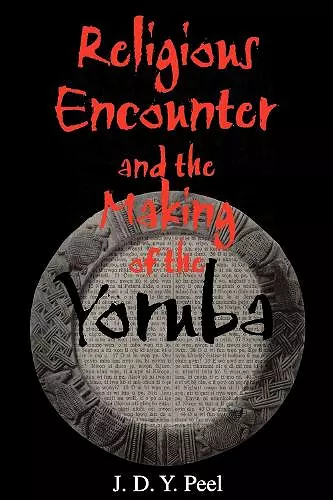Religious Encounter and the Making of the Yoruba
Format:Paperback
Publisher:Indiana University Press
Published:21st Feb '03
Currently unavailable, and unfortunately no date known when it will be back

How the Yoruba encounter with Christianity transformed their culture and identity.
Contends that it is through their encounter with Christian missions in the mid-19th century that the Yoruba came to know themselves as a distinctive people. This book focuses on the experiences of ordinary men and women and shows how the process of Christian conversion transformed Christianity into something more deeply Yoruba.
"Peel is by training an anthropologist, but one possessed of an acute historical sensibility. Indeed, this magnificent book achieves a degree of analytical verve rare in either discipline." —History Today
"[T]his is scholarship of the highest quality. . . . Peel lifts the Yoruba past to a dimension of comparative seriousness that no one else has managed. . . . The book teems with ideas . . . about big and compelling matters of very wide interest." —T. C. McCaskie
In this magisterial book, J. D. Y. Peel contends that it is through their encounter with Christian missions in the mid-19th century that the Yoruba came to know themselves as a distinctive people. Peel's detailed study of the encounter is based on the rich archives of the Anglican Church Missionary Society, which contain the journals written by the African agents of mission, who, as the first generation of literate Yoruba, played a key role in shaping modern Yoruba consciousness. This distinguished book pays special attention to the experiences of ordinary men and women and shows how the process of Christian conversion transformed Christianity into something more deeply Yoruba.
Peel is by training an anthropologist, but one possessed of an acute historical sensibility. Indeed, this magnificent book achieves a degree of analytical verve rare in either discipline.
* History Today *For three decades Peel has published on the Yoruba—Aladura: A Religious Movement among the Yoruba (1968) has become an anthropological classic. Now Peel sets an anthropological aim (studying the impact of the Church Missionary Society on a group of Africans who became the Yoruba) but takes form and mode from history (employing events and missionary journals as sources). Early missionaries in the later 19th century included Europeans and ex-slave returnees from Sierra Leone; these men were the quintessential cultural middlemen, adapting Christianity and transforming Yoruba identity in a single seamless process. This 11-chapter book presents a useful discussion of narratives of religion and of empire, and Peel makes a very important point: early missionaries saw heathenism as an absence or vacuum, rather than as something with durability, style, and an ethos of its own. Further chapters are titled Yorubaland at War, Missionary Power, Preaching the Word, Paths to Conversion, and The Making of the Yoruba. In Engaging with Islam, Peel explains that Islam and Christianity were in competition and both religions had to .. offer a means to individual and collective empowerment and they had to offer attractive, viable identities. Well documented with valuable notes and references-cited section. General readers; all academic levels.November 2001
-- B. M. du Toit * emeritus, University of FloriISBN: 9780253215888
Dimensions: unknown
Weight: 590g
440 pages